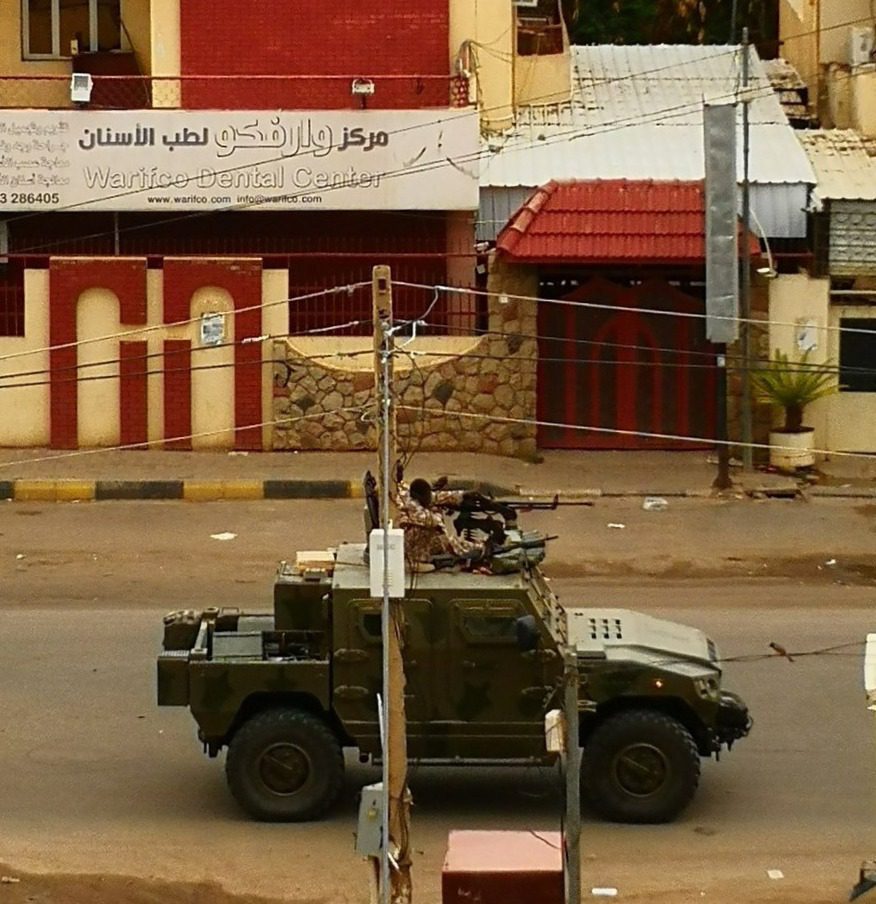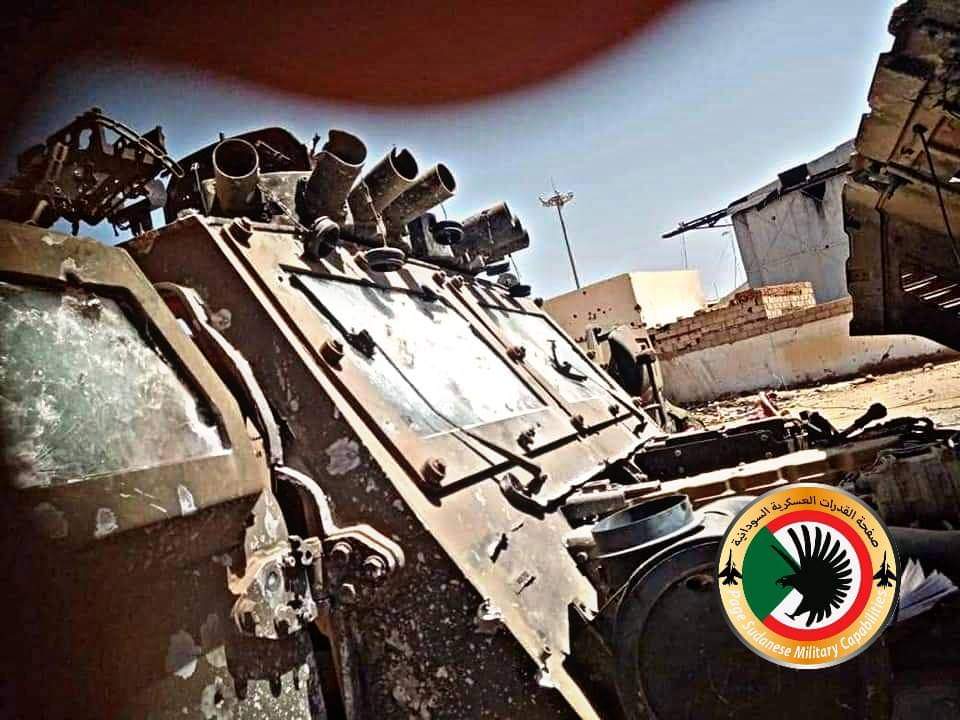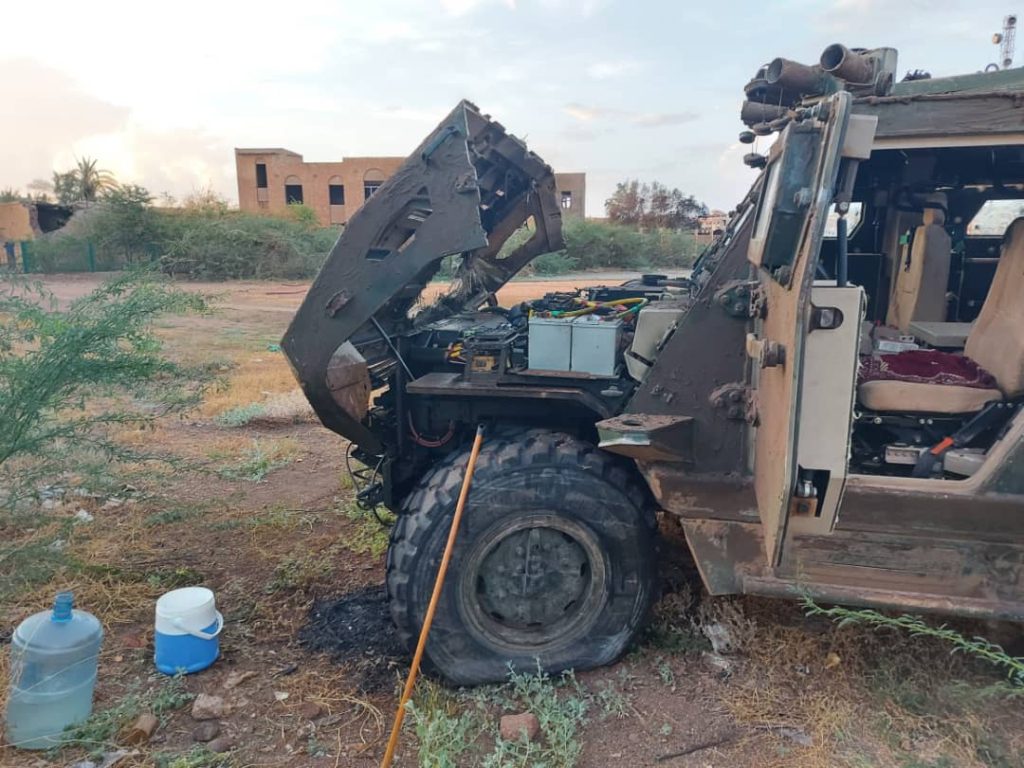French-manufactured military technology incorporated into armoured personnel carriers made by the United Arab Emirates is being used on the battlefield in Sudan in what likely constitutes a violation of the UN arms embargo on Darfur, Amnesty International said in a new investigation.
In a briefing published earlier this year, Amnesty International identified armoured personnel carriers (APCs) in various parts of Sudan made in the United Arab Emirates (UAE). New research has shown that these APCs, which are in use by the Rapid Support Forces (RSF), include sophisticated French-designed and manufactured reactive defense systems.
The Nimr Ajban APCs are manufactured in the UAE by the Edge Group, and equipped with the French Galix System. In pictures shared on social media and verified by Amnesty International, several Nimr Ajban APCs destroyed or captured by the Sudanese Armed Forces (SAF) have the Galix System visible.

The Galix System – made by Lacroix Defense and jointly designed with Nexter (now KNDS France) – is a defense system for land forces that releases decoys, smoke and projectiles to counter close-range threats. Lacroix Defense advertises that the Galix System “hides fighting vehicles from an approaching threat and protects the vehicles, main battle tanks and APCs”.
All countries must immediately cease direct and indirect supplies of all arms and ammunition to the warring parties in Sudan.
Agnès Callamard, Amnesty International’s Secretary General
“Our research shows that weaponry designed and manufactured in France is in active use on the battlefield in Sudan,” said Agnès Callamard, Amnesty International’s Secretary General.
“The Galix System is being deployed by the RSF in this conflict, and any use in Darfur would be a clear breach of the UN arms embargo. The French government must ensure that Lacroix Defense and KNDS France immediately stop the supply of this system to the UAE.
“Amnesty International has already shown how the constant flow of arms into Sudan is causing immense human suffering. All countries must immediately cease direct and indirect supplies of all arms and ammunition to the warring parties in Sudan. They must respect and enforce the UN Security Council’s arms embargo regime on Darfur before even more civilian lives are lost.”

Amnesty International contacted Lacroix Defense, KNDS France and the Secretariat-General for National Defence and Security in France on 15 October 2024 highlighting the identification of the Galix System in Sudan. At the time of publication, no response had been received.
The UAE and France have a long-standing partnership in the defense sector. The French parliamentary 2024 report on arms export indicates that French companies were responsible for delivering an estimated EUR €2.6 billion in military equipment to the UAE between 2014 and 2023.
Lacroix Defense has an established presence in the UAE, having set up a joint venture with Emirates Defense Technology as early as 2015 to be “one of the first French intermediate-sized companies to localize in the UAE”. Nimr Ajban APCs have been equipped with the Galix system since at least 2017.
The European Union has imposed an arms embargo on the whole of Sudan since 1994. The embargo prohibits the sale, supply, transfer or export of arms and related materiel of all types, including weapons and ammunition, military vehicles and equipment, paramilitary equipment and spare parts to Sudan.

France is bound by international, regional and national laws to prohibit the export of arms where there is a substantial risk that the arms could be used to commit or facilitate a serious violation of international human rights or humanitarian law. If France cannot guarantee through export controls, including end user certification, that arms will not be re-exported to Sudan, it should not authorise those transfers. The UAE has a long track record of breaching UN Security Council arms embargoes, including in relation to Libya and Sudan.
All companies, including Lacroix Defense and KNDS France, have a responsibility to respect human rights. This responsibility requires companies to conduct human rights due diligence throughout their entire value chain – from the point of origin to the end user – to identify, prevent, and mitigate any actual or potential involvement in human rights abuses. The standard of human rights due diligence required is heightened with respect to business activity impacting conflict-affected areas.
Amnesty International is also calling for the UN Security Council to expand its arms embargo on Darfur to the rest of Sudan and to strengthen its implementation, monitoring and verification mechanisms.
Fighting erupted in Sudan in April 2023 between the SAF and RSF paramilitaries. Since then, more than 23,000 people have been killed and 33,000 injured, of which a substantial number are civilians who have been impacted by indiscriminate and deliberate attacks. Sudan is currently the world’s largest displacement crisis with the latest escalation in conflict displacing more than 11 million people.
On 15 April 2024, the first anniversary of the recent escalation in conflict, Amnesty International launched a global petition urging the UN Security Council to extend the existing arms embargo beyond Darfur to the rest of Sudan. This is part of a wider Amnesty International campaign advocating for protection of civilians in Sudan, and calling for accountability for those who have committed atrocities against civilians.
Tags: Sudan, France, Human Rights.
Kyrgyzstan: Detention of Rita Karasartova is sign of deepening repression
Sudan: Two years of war and shameful international neglect
Azerbaijan: Authorities must immediately release Tofig Yagublu
Sudan: RSF’ horrific use of sexual violence leaves lives in tatters
Honduras: The candidates have an opportunity to commit to human rights
Contact Us
Regional - Américas
Calle Luz Saviñón 519, Colonia del Valle Benito Juárez, 03100. Ciudad de México, México
Global
1 Easton Street, London WC1X 0DW. Reino Unido.